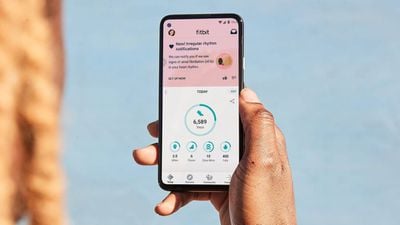Continuous AFib Monitoring Coming to Fitbit Watches Following FDA Approval
Fitbit owner Google this week came a step closer to rivaling the health features of Apple Watch after the FDA approved its new algorithm for continuously monitoring users' heart rate rhythms.

Like Apple Watch, Fitbit devices with a heart-rate monitoring capability include an ECG app that must be manually run by the user to check for irregular rhythms, which can be a sign of atrial fibrillation (AFib), a potentially serious heart arrhythmia condition. AFib affects nearly 33.5 million people globally, and individuals with AFib have five times higher risk of stroke.
For several years, the Apple Watch has had one up on rival smartwatches by including an irregular rhythm notifications feature, which occasionally checks heart rhythm in the background and sends a notification if an irregular heart rhythm is identified that could potentially be atrial fibrillation (AFib). Upon receiving a notification, users can then launch the ECG app and perform a more comprehensive 30-second test by placing their finger on the Digital Crown to generate an ECG waveform.
Google's new PPG (photoplethysmography) algorithm works similarly by passively monitoring heart rhythm in the background overnight and whenever the user is resting, making for a potentially more capable life saver.
The clinical validation for Fitbit's PPG algorithm is supported by data from the landmark Fitbit Heart Study, which launched in 2020 and enrolled 455,699 participants over five months. The study was conducted entirely virtually during the pandemic, making it one of the largest remote studies of PPG-based software to date. Data presented at the 2021 American Heart Association Scientific Sessions found that the Fitbit PPG detections correctly identified AFib episodes 98% of the time, as confirmed by ECG patch monitors.
Google says the new PPG-based algorithm and Irregular Heart Rhythm Notifications feature will soon be available to consumers in the U.S. across a range of heart-rate enabled Fitbit devices.
Apple plans to further bolster the health smarts offered by Apple Watch this year, with a new body temperature monitoring sensor expected to feature in the Apple Watch Series 8. As part of watchOS 9, Apple is also planning to improve its existing atrial fibrillation detection feature with a new capability to measure how long a person is in a state of atrial fibrillation across a certain period.
Popular Stories
While the iPhone 17 Pro and iPhone 17 Pro Max are not expected to launch until September, there are already plenty of rumors about the devices.
Below, we recap key changes rumored for the iPhone 17 Pro models as of April 2025:
Aluminum frame: iPhone 17 Pro models are rumored to have an aluminum frame, whereas the iPhone 15 Pro and iPhone 16 Pro models have a titanium frame, and the iPhone ...
Apple may have updated several iPads and Macs late last year and early this year, but there are still multiple new devices that we're looking forward to seeing in 2025. Most will come in September or October, but there could be a few surprises before then.
We've rounded up a list of everything that we're still waiting to see from Apple in 2025.
iPhone 17, 17 Air, and 17 Pro - We get...
A common complaint about the iPad Pro is that the iPadOS software platform fails to fully take advantage of the device's powerful hardware.
That could soon change.
Bloomberg's Mark Gurman today said that iPadOS 19 will be "more like macOS."
Gurman said that iPadOS 19 will be "more like a Mac" in three ways:Improved productivity
Improved multitasking
Improved app window management...
Apple's upcoming foldable iPhone (or "iPhone Fold") will feature two screens as part of its book-style design, and a Chinese leaker claims to know the resolutions for both of them.
According to the Weibo-based account Digital Chat Station, the inner display, which is approximately 7.76 inches, will use a 2,713 x 1,920 resolution and feature "under-screen camera technology." Meanwhile, the...
Apple in October 2024 overhauled its 14-inch and 16-inch MacBook Pro models, adding M4, M4 Pro, and M4 Max chips, Thunderbolt 5 ports on higher-end models, display changes, and more. That's quite a lot of updates in one go, but if you think this means a further major refresh for the MacBook Pro is now several years away, think again.
Bloomberg's Mark Gurman has said he expects only a small...
Apple is working on a new version of the Vision Pro with two key advantages over the current model, according to Bloomberg's Mark Gurman.
Specifically, in his Power On newsletter today, Gurman said Apple is developing a new headset that is both lighter and less expensive than the current Vision Pro, which starts at $3,499 in the U.S. and weighs up to 1.5 pounds.
Gurman said Apple is also...
On this week's episode of The MacRumors Show, we catch up on the latest iOS 19 and watchOS 12 rumors, upcoming devices, and more.
Subscribe to The MacRumors Show YouTube channel for more videos
Detailed new renders from leaker Jon Prosser claim to provide the best look yet at the complete redesign rumored to arrive in iOS 19, showing more rounded elements, lighting effects, translucency, and...
It was a big week for leaks and rumors in the Apple world, with fresh claims about iOS 19, the iPhone 17 Pro, and even the 20th anniversary iPhone coming a couple of years from now.
Sources also spilled the tea on the inner turmoil at Apple around the Apple Intelligence-driven Siri revamp that has seen significant delays, so read on below for all the details on these stories and more!
iOS ...
Apple and other electronics manufacturers have received a break from Trump's reciprocal tariffs, with the U.S. Customs and Border Protection agency sharing a long list of products excluded from the levies last night.
iPhones, Macs, iPads, Apple Watch, and other Apple devices will not be subject to the 125 percent tariffs that have been put in place on imported Chinese goods, nor will Apple...
























